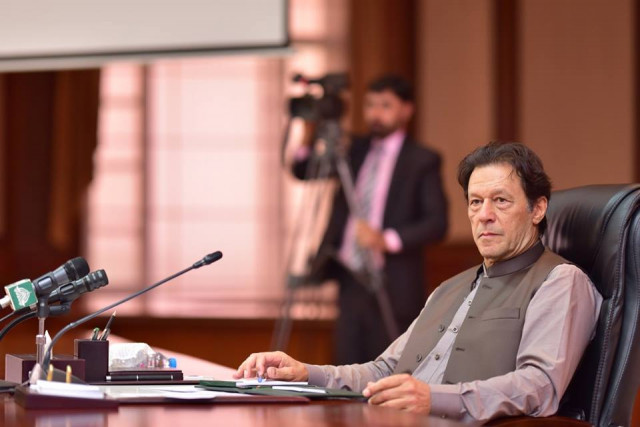PM promises economic jumpstart by July
Urges traders to help alleviate poverty; concedes unnecessary delay hit IMF deal

PM Imran Khan. PHOTO: PID
"Economic stability will return by July [2019] and the rupee will settle down at the same time," Syed Mazhar Ali Nasir, the adviser to the Federation of Pakistan Chamber of Commerce and Industry (FPCCI) president, quoted the prime minister as saying at his meeting with the Karachi-based business community at the Sindh Governor's House on Friday.
The stabilisation will be followed by measures to revive exports and promote domestic industries so that substitutes for imported items could be produced in the country, he further cited PM Imran as saying.
Pakistan's tough decisions on economy to pay dividends: Fitch
The prime minister was accompanied by Sindh Governor Imran Ismail and Adviser to the PM on Commerce and Industries Abdul Razak Dawood.
Pakistan signed a staff-level agreement with the International Monetary Fund (IMF) on May 12 for a 39-month loan programme worth $6 billion.
The implementation of IMF conditions for the bailout package including allowing the depreciation of the rupee against the US dollar and aggressively increasing the key interest rate has rattled the economy in recent days.
The IMF board is expected to give the final approval for the execution of the loan programme in June. This means that Pakistan will receive the first tranche of the loan in June or July, when the prime minister foresees an economic revival.
Pakistan is also scheduled to present the budget for the fiscal year 2019-20 on June 11, which will become effective from July 1.
'IMF programme aimed at reducing Pakistan's public debt'
Another participant of the meeting said PM Imran had conceded that his government had unnecessarily delayed entering the IMF loan programme and that had created a period of prolonged economic uncertainty in the country.
The prime minister also noted that there was a need to facilitate small and medium-sized enterprises (SMEs) for the revival of the economy, as the sector continued to play a major role in production and providing employment opportunities.
"We have proposed to the prime minister to appoint a full-time minister for the SME sector," Nasir said.
The FPCCI official further said the prime minister continued to remain in close contact with the business community of the country to overcome economic challenges.
He held a meeting with the business community at Bani Gala on May 19.
A handout issued by the Press Information Department added that the prime minister asked the business community to benefit from the recently announced amnesty scheme.
He said his government was fully committed to reviving businesses.
The premier also asked the business community to play its role in pulling the country out of its financial crisis and alleviating poverty.
He said his government had now put together a team of competent economic managers including Dr Reza Baqir, the governor of the State Bank of Pakistan and Shabbar Zaidi, the chairman of the Federal Board of Revenue.
‘Knowledge-based economy must to meet development goals’
Complaints
The business community complained to the prime minister that the cost of doing business in the country had become too expensive after his government let the rupee depreciate massively against the US dollar and aggressively hiked the key interest rate.
The central bank let the rupee depreciate by 43% to Rs150.91 against the greenback since December 2017 and increased the key interest rate by 6.5 percentage points to a 91-month (eight-year) high at 12.25% since January 2018.
Renowned businessman Aqeel Karim Dhedhi said at the meeting that the massive hike in the interest rate had discouraged new investment.
Moreover, banks have opted to lend available liquidity to the government at such high rate of return and become reluctant to provide credit to the private sector. "This situation doesn't favor industrialisation," Dhedhi told the prime minister.
SM Muneer, former CEO of the Trade and Development Authority of Pakistan (TDAP), asked the premier not to end the zero-rating facility for five textile export sectors as that would open new doors of corruption.
Another seasoned businessman, Siraj Kassam Teli, said the government should ensure that names of the businessmen who availed the amnesty scheme remained confidential.
Housing Scheme
Zaigham Mahmood Rizvi, the chairman of the prime minister's taskforce on housing, said PM Imran discussed ideas with renowned businessmen Arif Habib and Dhedhi on creating an enabling environment for the poor by letting them own their own home.
The prime minister discussed the ideas at a separate meeting on the Naya Pakistan Housing Scheme for the construction of five million homes in the next five years.
The meeting concluded on the note that the premier would invite all stakeholders including the State Bank of Pakistan, the Securities and Exchange Commission of Pakistan, builders and investors to a follow-up meeting.
The formation of a one-window operation to facilitate foreign investors in the housing scheme was also discussed.


















COMMENTS
Comments are moderated and generally will be posted if they are on-topic and not abusive.
For more information, please see our Comments FAQ